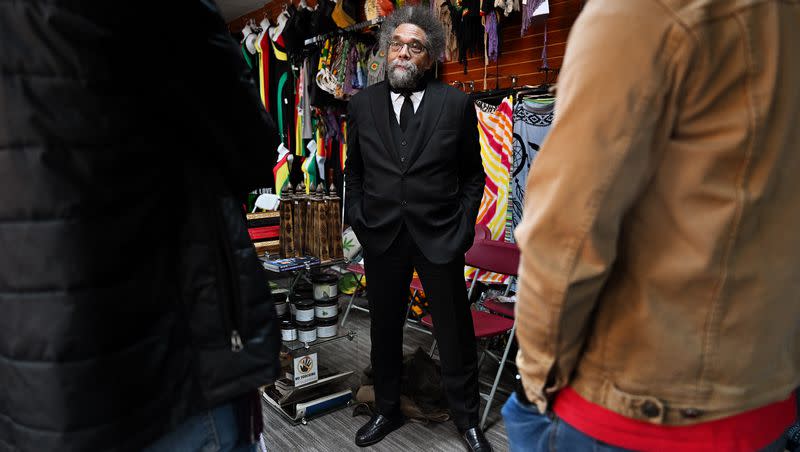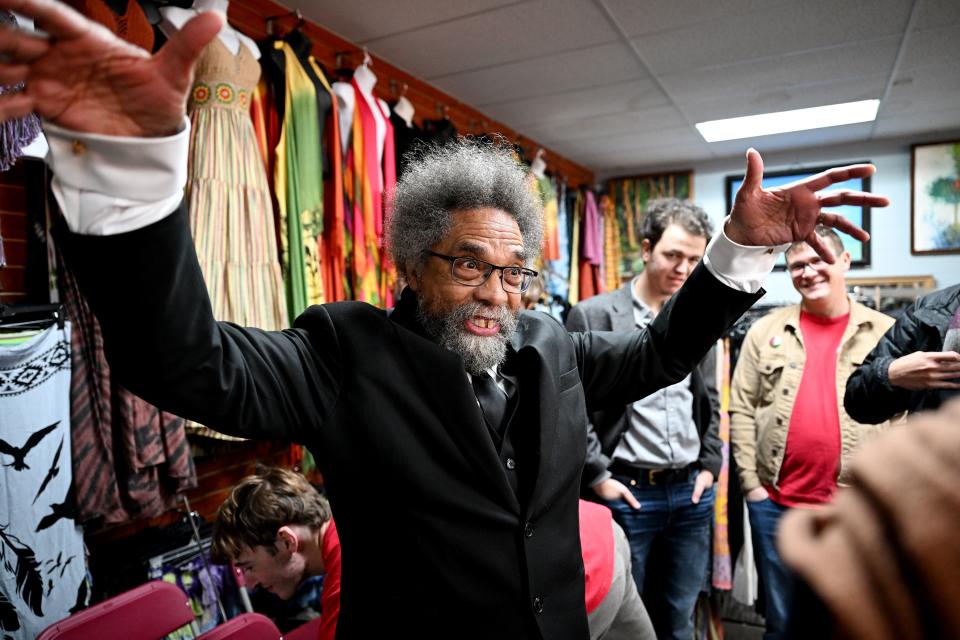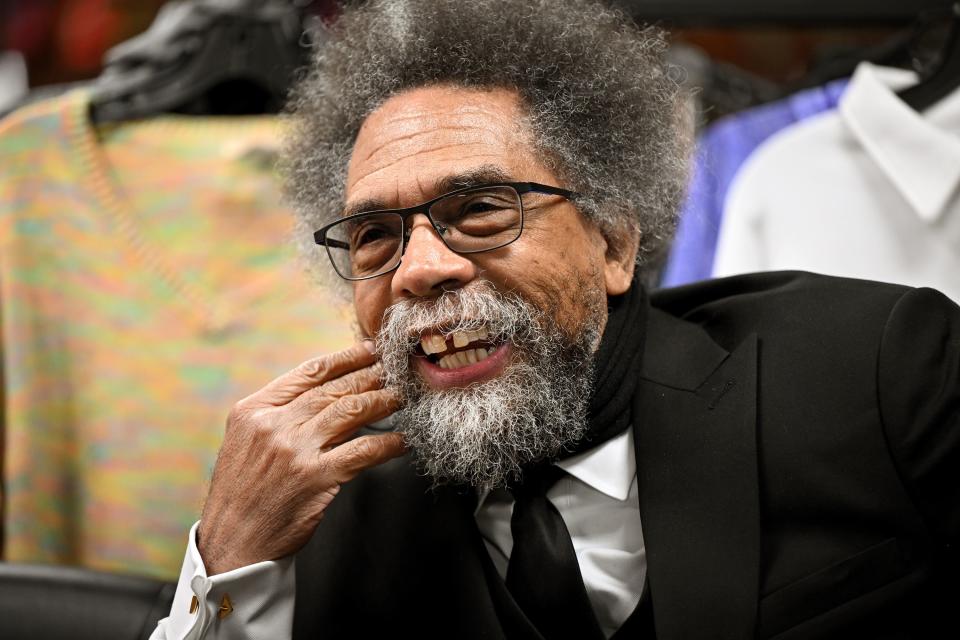The philosopher-in-chief

- Oops!Something went wrong.Please try again later.
- Oops!Something went wrong.Please try again later.
- Oops!Something went wrong.Please try again later.
There’s no presidential candidate quite like Dr. Cornel West. He’s a public philosopher, not a politician; he’s more inclined to speak of America’s challenges as moral conundrums than as policy failures. Instead of citing Washington and Jefferson on the stump, he quotes Stevie Wonder and Duke Ellington. And instead of strategically launching the first in-person rally of his campaign in Pennsylvania or Georgia or any other number of 2024 swing states, West touched down in Salt Lake City Monday night, on the eve of the city’s mayoral election.
The reason, West told a crowd of of about 200 at the University of Utah’s student union, is simple: the city is about to choose its mayor by ranked choice voting for the first time, a victory for democracy, per West’s view. He’d also come to endorse Michael Valentine, a 35-year-old activist facing off against an incumbent, Erin Mendenhall, and one of her predecessors, Rocky Anderson — each vying to become the leader of Utah’s most progressive city.
It didn’t hurt, either, that Utah’s relatively lax rules to get on a presidential ballot — you just need to get the requisite signatures and pay a fee — bode well for West.
“As you all know, we’re focusing on ballot access,” West said. “Utah is going to be the No. 1 state in my campaign that will put me on the ballot.” The crowd cheered.
West already wears many hats: a public intellectual, a pastor, a professor, a jazz musician. His newest one, that of “presidential candidate,” was an uncomfortable fit at first. He launched his campaign in June on the People’s Party ticket, but abandoned the group after less than two weeks. He then ran as the Green Party nominee, but by October, he cut ties with that party, too, in order to run as an independent.
“There’s such a moment of fluidity right now,” West told me. “There’s a general disenchantment with the establishments in both parties.”
We met a few hours before West took the stage at the University of Utah, sitting between racks of clothing at an Afro Caribbean shop in downtown Salt Lake City. He spoke about his progressive platform in sweeping terms, mentioning his efforts to combat economic disparity, climate change and racism.
Voters on the right largely ignore West’s left-wing message. Years ago, he’d likely have been brushed aside by the left, too. But Biden is losing favor with a growing faction of progressive voters who see his support for Israel as disqualifying. Coupled with the relative success of Bernie Sanders’ socialist message in the 2016 and 2020 elections, West may be a long shot to win the White House, but he has a viable opening to at least make things interesting on the left.
But unlike Sanders, who describes himself as “not particularly religious,” West’s message is not just one of social revolution, but of a spiritual one. America is dealing with “spiritual decay” and “moral decadence,” he told me — a time when “just being committed to a quest for truth can make you almost revolutionary.” He speaks of issues as decisions between moral right and wrong, and his biggest critique of Biden is not his platform, but his “moral cowardliness.”
“My whole conception of the world is to look at it through the lens of the cross,” West said. “That cross signifies unarmed truth and unapologetic love for others, no matter who they are.”
That lens has caused West to construct some unorthodox bridges. He points to his friendship with Robert P. George, a staunch conservative and one of America’s leading scholars on religious liberty, as a relationship that inspires him to be better.
“Since he’s ‘the real thing’ as a conservative, I try to be ‘the real thing’ as whatever I am,” he said. And he cherishes his friendship with the late University of Utah President Chase Peterson, who served as dean of admissions when West was admitted to Harvard. West later wrote the foreword to Peterson’s book.
“People would say, ‘How’d this Mormon brother get this Black brother writing the preface?’” West recalled. “Well, he was my dear brother.”
Biden was West’s brother, too, in 2020 — in the Trump-Biden general election that year, West encouraged voters to show up for Biden, while insisting the then-Democratic nominee should go further to the left on health care policy and other issues. Three years later, West still considers Trump to be a “gangster,” but he now thinks Biden is in “deep trouble,” too.
“I think there’s a very good chance (Biden) may not even be the candidate,” West told me. “I think there’s a good chance he’ll run out of gas, and there’s a chance Trump might end up in jail.”
I asked if that was a reference to Biden’s age. The president turned 81 on Monday. West, 70, smiled. “All of us are growing old, so I don’t worry about the age question,” he said. “It’s just a matter of whether he can be a viable candidate.”

West’s crowd at the Utah Student Union was modest — about 200 attendees, mostly college-aged. A handful carried Palestinian flags. One told me she has family in the West Bank, and she was interested in West’s candidacy because of his stance on the war in the Middle East. In a way, his audience was an encapsulation of the voter bloc that recent polls show are Biden’s biggest vulnerability: young people, people of color, and those who disagree with Biden’s support for Israel.
West’s relationship with the Democratic Party is complicated. He worked as a senior adviser to a long-shot Democrat running in the 2000 presidential primary. He publicly endorsed then-Sen. Barack Obama’s presidential candidacy in 2007, but after Obama reached the White House, West became disillusioned with the president, calling him a “Rockefeller Republican in blackface.” He endorsed Bernie Sanders in 2016 and 2020.
While West makes few waves in national polls — ranging from 1% to 5% in most — his candidacy, especially as of late, could prove a headache for the Biden campaign. In late summer, polls showed a West campaign pulling far more support from potential Biden voters than Trump ones, as expected.
But Biden’s support for Israel has made him vulnerable among Democratic voters who sympathize with Palestinians. Many of Biden’s big-money Arab American boosters felt betrayed and publicly jumped ship. One State Department official resigned. Biden’s approval rating is now at the lowest of his presidency, with the largest erosion coming from Democrats and young voters.
West stands positioned in the crevice, seemingly poised to capture support from disillusioned progressives. “I think it’s going to be one of the major issues of the election,” West said. “No one would have thought that six months ago, nine months ago.”
When Harvard students blamed Israel for the Oct. 7 Hamas attack, West said they should’ve included more nuance, but agreed that Israel and the U.S. were “primarily responsible.” When Israel retaliated for the attack, he delivered an impassioned speech accusing Israel of genocide. He’s repeatedly called for a cease-fire and criticized Biden for not doing the same.
Then late October, West’s campaign manager called it quits, citing “extreme stress” and “trauma” triggered by the war in the Middle East. The loss was significant to the campaign — Peter Daou was an ex-Hillary Clinton adviser and had extensive organizing experience, and it made West’s chief challenge of getting on ballots across the country even more significant.
West responded with an unconventional solution: hiring four campaign managers who’d each handle one aspect of the campaign — one on policy, another fundraising, the others advance and organizing. The staffers are in the process of “unionizing as a worker cooperative,” Anthony Karefa Rogers-Wright, one of the managers, told me. And to prevent burnout, with four people carrying the load, they all get to take one weekend a month off.
The new system is patterned after John Coltrane’s jazz quartet, West said. “As Brother Coltrane’s offering was the shape of jazz to come, this new cooperative management model is very much the shape of what’s to come politically, electorally, and so much more.”
None of the organization will mean anything, though, if West cannot get on the ballot. Each state has different requirements for independent candidates, and one of the significant barriers West faces after ditching the Green ticket is losing the party’s well-established infrastructure for ballot access.
“It’s going to be difficult,” Rogers-Wright said. “But the people who love Brother West the most are organizers.”
Not all of those organizers are wholly convinced that a West candidacy is the answer, though. One student who attended the Monday rally said he “liked West” but didn’t want “to put Trump in the White House.” Another said he thought “West would be way better than Biden, but Biden would be way better than Trump.” When I asked him if he was implying he feared voting for West would risk a Trump victory, he hesitated, then nodded. “Yeah,” he said.
West rejects this line of reasoning. Citizens should vote for a candidate, not against one, he said. “I come from a tradition of a people whose anthem is ‘Lift Every Voice,’ not ‘follow the pied piper,’” he said. “I don’t own their vote. Nobody owns anybody else’s vote.”
He leaned back in his chair and began telling a story. He was in Los Angeles recently, he told me, at a barber shop on Skid Row. A man approached him. “Brother West,” the man said. “We sure appreciate you giving us a choice, because with Trump, you’ve got Civil War II, and with Biden, you’ve got World War III.”
West raised his hands to his chin, contemplatively. “We’ve reached the point where this is a choice between mendacity and criminality, or mediocrity and criminality,” he said.
I asked which of those two options is more dangerous. He thought for a moment. “It’s a choice you don’t want to make,” he said. “You can never confine yourself to just the framework or the status quo. You’re always looking for an alternative.”


